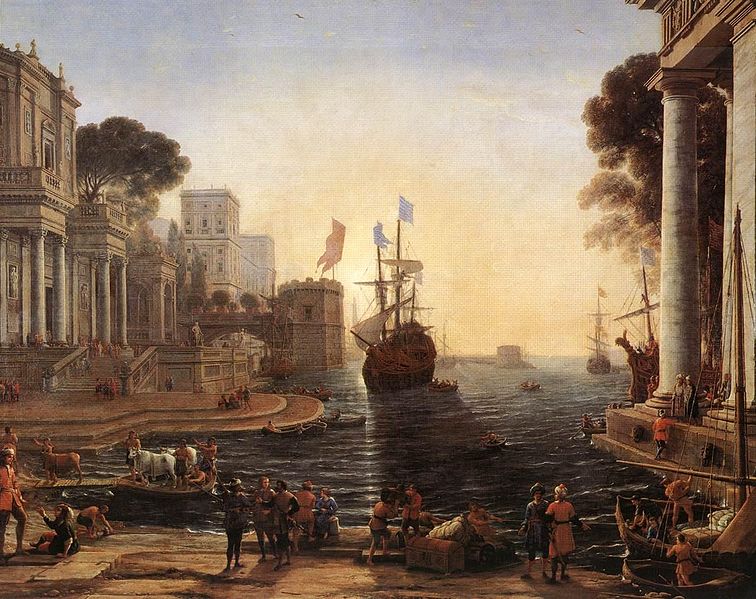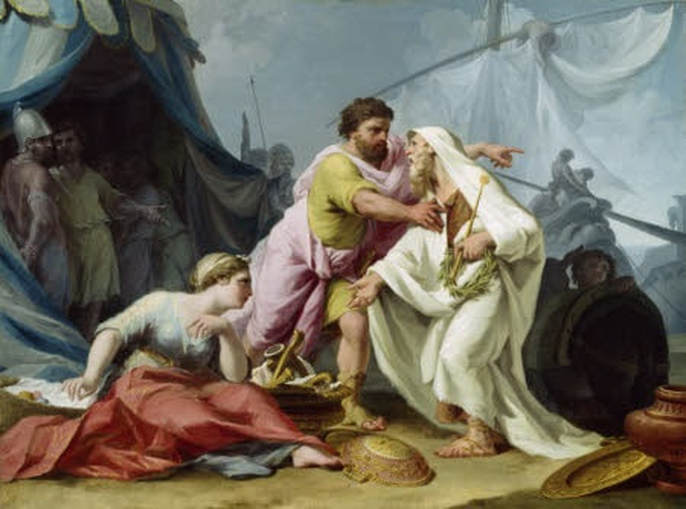Chryseis
In Greek mythology, Chryseis (Ancient Greek: Χρυσηΐς) is a Trojan woman, the daughter of Chryses. Chryseis, her apparent name in the Iliad, means simply "Chryses' daughter"; later writers give her real name as Astynome (Ancient Greek: Ἀστυνόμη).
The poet Tzetzes describes her to be "very young and thin, with milky skin; had blond hair and small breasts; nineteen years old and still a virgin".
As the "golden one" she is also the title-giving character of the Baroque alchemical epic Chryseidos Libri IIII.
Mythology
Chryseis would be resident of the city of Thebe, a city of east of Mount Ida, and it was in this city that Chryses paid homage to Apollo. The city of Thebe would be ruled by King Eetion, the father of Andromache, and Thebe was thus an ally of Troy.
Chryseis/Astynome was sent by her father for protection, or, according to others, to attend the celebration of a festival of Artemis in Hypoplacian Thebe or in Lyrnessus where she was taken as prisoner by Achilles (when the city was taken by the Achaean forces).
According to some, she was the wife of Eetion, king of Lyrnessus (usually described as the ruler of nearby Cilician Thebe) who was killed by the son of Peleus during his campaigns against the allies of Troy.
In the first book of the Iliad, during the distribution of the booty brought by Achilles, she was given to Agamemnon by unanimous decision in view of his kingly office.
As a war prize, Agamemnon who admitted that she was finer than his own wife Clytemnestra, enslaved Chryseis and refused to allow her father to ransom her even though the priest of Apollo offered the Mycenaean king gifts of gold and silver.
Thus, Chryses left the Achaean camp alone, but Chryses then called upon Apollo to avenge him, and of course, Apollo listed to the prayers of his priest.
Hence, Apollo, in the darkness of night, came through the Achaean camp, and unleashing his arrows, brought down a plague upon the Achaeans, and the army was thus decimated by disease.
Agamemnon would call upon Calchas, the Achaean seer, to explain the plague ravaging his army, and of course Calchas revealed that the plague would not lift until Chryseis was returned to her father.
This of course was not what Agamemnon wished to hear, and Agamemnon called Calchas "a prophet of evil", but nevertheless Agamemnon was forced to heed the words of his seer, and Agamemnon agreed finally to return Chryseis.
But there was though a proviso, that Agamemnon would need a prize equal to Chryseis. And there was one such prize already in the Achaean hands, for Achilles had taken the beautiful Briseis as his own prize; and so even as Odysseus was returning Chryseis to her father, when were being sent to take Briseis from Achilles.
Such an act was unworthy of Agamemnon, and an indignant Achilles would refuse to take to the battlefield again, with devastating impact upon the fortunes of the Achaeans.
After the attack on Rhesus and his Thracian armies, Chryses came to the Greeks to thank them for returning his daughter, Astynome. Because of this kindness, and because he knew that his daughter had been properly treated, he brought her back for Agamemnon to have.
A later Greek legend, preserved in Hyginus' Fabulae, states that she had a son named after her father by Agamemnon. In the city of Thebes in Asia Minor, Chryseis gave birth to Chryses and declared him to be a son of Apollo. This took place when she was released shortly as a prisoner and allowed to return to her hometown.
A few years later, when the children of Agamemnon, Orestes and Iphigenia took refuge in the Island of Sminthos, now the home of Chryseis and her family, she proposed surrendering the fugitives to King Thoas. Her son Chryses, learning they were his half-siblings, helped them to kill the Taurian king.
In medieval literature, Chryseis is developed into the character Cressida.

Sources
Scholia on the Iliad; Hesychius, Lexicon; Malalas, Chronographia 100; Eustathius of Thessalonica, Commentary on the Iliad 1.123.9 van der Valk.
Hyginus, Fabulae
John Tzetzes. Antehomerica, 353-355
Dictys Cretensis. Trojan War Chronicle, 2.17 & 2.19
Dictys Cretensis. Trojan War Chronicle, 2.28
Homer. Iliad, 1.378
Eustathius ad Homer. Iliad, pp. 77, 118
Dictys Cretensis. Trojan War Chronicle, 2.47













